Key takeaways:
- Pandemic stress led to widespread feelings of anxiety and isolation, highlighting the need for human connection and mental health resources.
- Recognizing personal stress symptoms was crucial; it helped in addressing issues like irritability and hyper-vigilance.
- Establishing routines, engaging in mindfulness, and maintaining social connections became effective strategies for managing stress during the pandemic.
- The pandemic prompted self-reflection, leading to a renewed focus on relationships and the importance of adaptability and self-compassion.
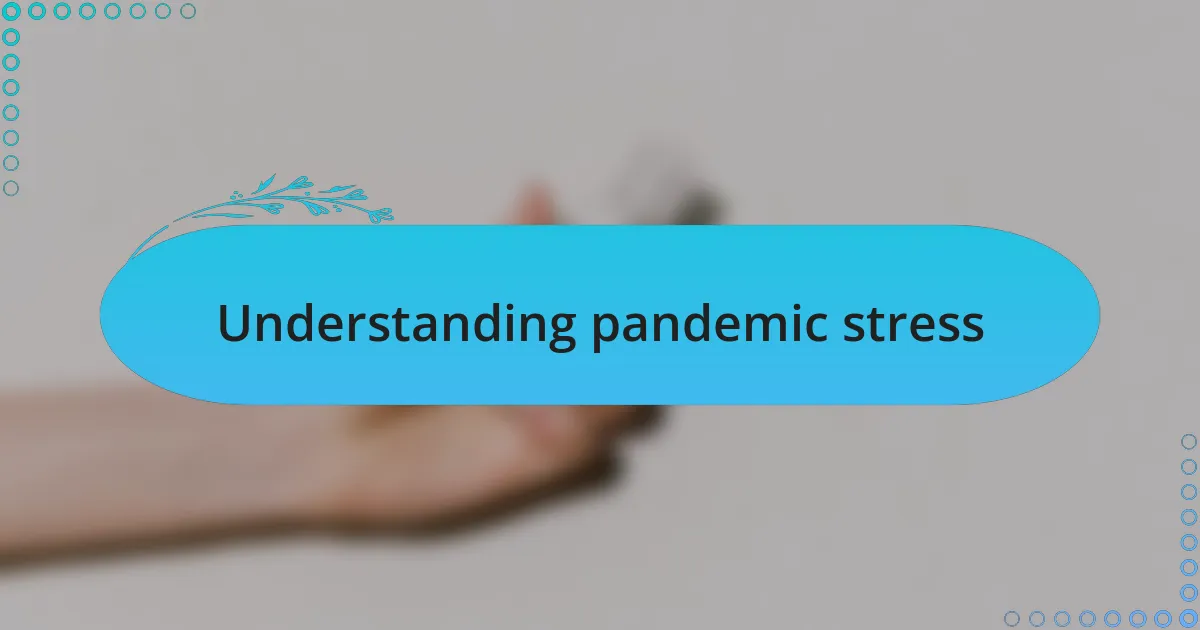
Understanding pandemic stress
Pandemic stress emerged as a multifaceted experience for so many of us, rooted in uncertainty and constant change. I remember the overwhelming anxiety that settled in, especially when news broke of a sudden lockdown. It made me question, “What does this mean for my future?” The lurking fear of the unknown loomed large, influencing daily choices and interactions.
Many of us found our routines upended, which only amplified feelings of isolation and frustration. One evening, I sat on my couch, staring at the walls, and realized how much I missed casual conversations and spontaneous outings. It struck me then: Isn’t the human connection a vital aspect of our well-being? The simple act of sharing a meal became a distant memory, and I yearned for moments of laughter and camaraderie.
As I navigated through this tumultuous period, I discovered that stress wasn’t just a personal struggle; it was a collective experience. Talking with friends and family revealed we were all battling a cloud of tension together. Did we ever think a global health crisis would feel so personal? Understanding this shared journey helped me find solace, reinforcing that we’re never truly alone, even when it feels like we are.

Exploring Covid health impacts
The health impacts of Covid extended far beyond the physical realm. I remember hearing about the rising cases of anxiety and depression, reflecting a broader emotional toll. It made me wonder, “How many of us are silently navigating a sea of worries each day?”
In my own experience, I noticed a shift in my sleep patterns. Stress crept in at night, twisting my thoughts into a whirlwind that left me exhausted by morning. Has anyone else experienced that unsettling feeling of lying awake, replaying the day’s events and what tomorrow might bring? This constant mental chatter not only drained my energy but also clouded my ability to focus during the day.
The pandemic also highlighted the importance of mental health resources. I found solace in online therapy sessions, but it made me think about those without access to such support. Why isn’t mental health considered on par with physical health in terms of urgency? Recognizing this gap in resources truly hit home for me, reinforcing the need for a collective push towards better mental health care during times of crisis.
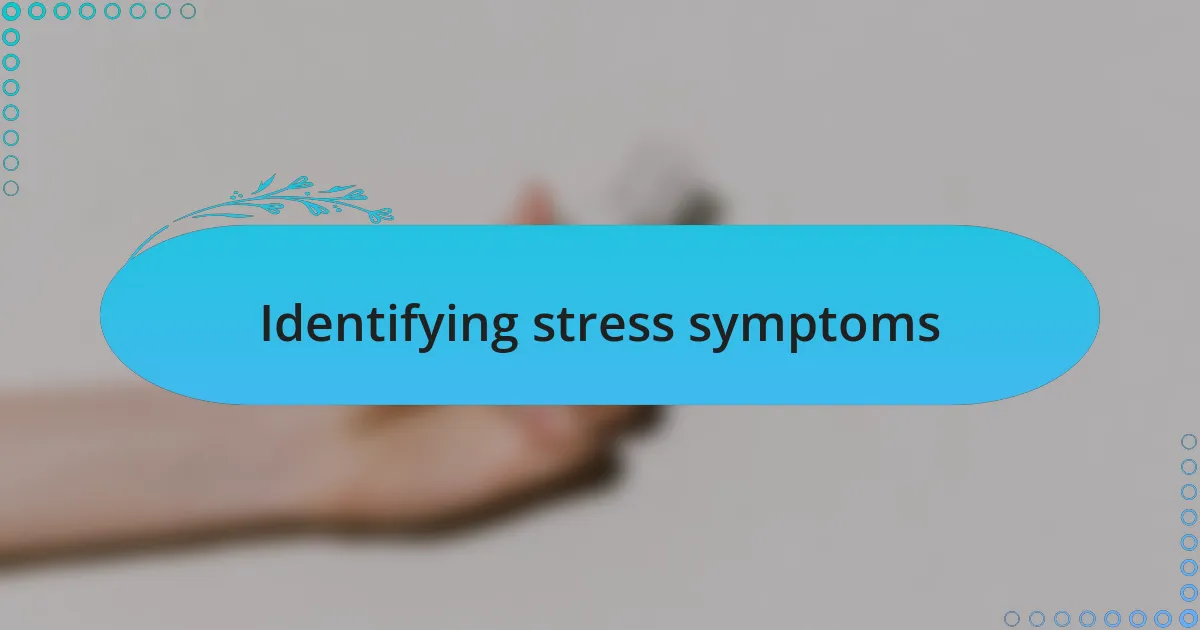
Identifying stress symptoms
Understanding stress symptoms was crucial for me during the pandemic. I vividly recall days when my heart seemed to race for no reason, or I found myself feeling an inexplicable weight on my chest. Have you ever experienced such physical manifestations of stress? I learned that recognizing these signs could be the first step toward addressing them.
As the pandemic wore on, I became aware of my irritability and mood swings. Little things, like a delayed online order, would send me into a spiral of frustration. Reflecting on this, I realized that stress is often like an invisible backpack; the more we weigh ourselves down with daily pressures, the harder it becomes to manage our emotions. It’s worth asking: how often do we stop to check what’s in our own backpacks?
Another telling sign of stress for me was the overwhelming feeling of being constantly on edge. I found myself jumping at unexpected noises or feeling restless even in familiar surroundings. This hyper-vigilance was exhausting, and brought to light the toll that prolonged stress can take on both our mental and physical health. Have you taken the time to notice how your body responds when life feels overwhelming? Making that connection can be a powerful step toward regaining control.
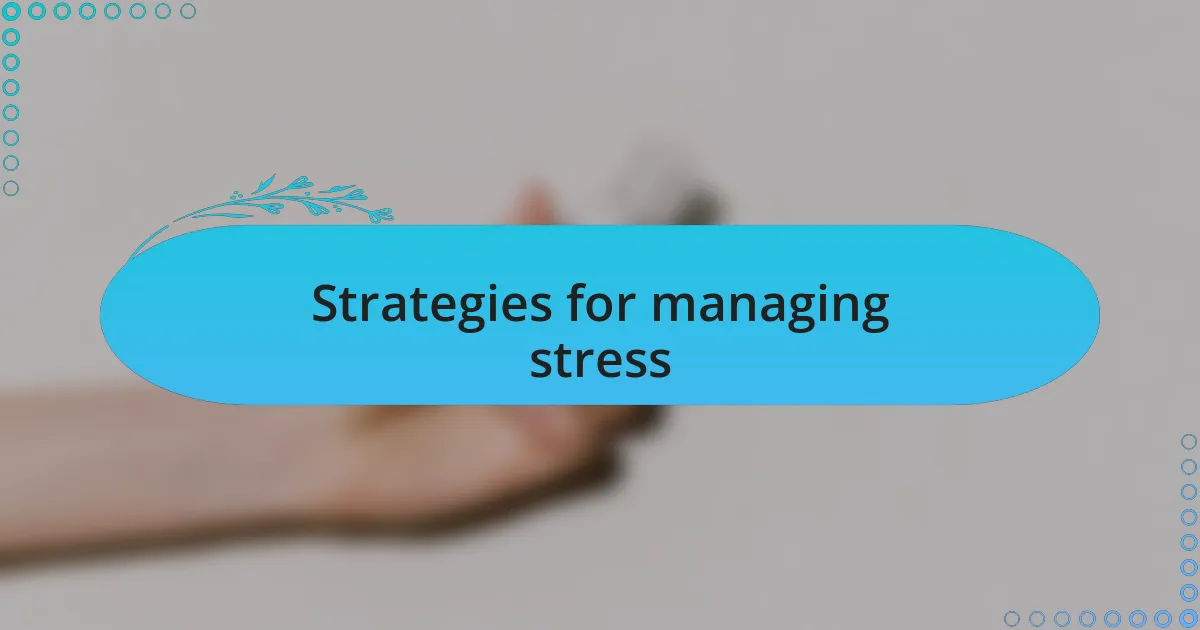
Strategies for managing stress
One effective strategy I found for managing stress was establishing a daily routine. In the early days of the pandemic, my world felt chaotic, so I created a schedule that included work, exercise, and moments of relaxation. What I discovered was that knowing what to expect from my day provided a comforting structure, helping to ease my anxiety and improve my overall mood. Have you tried setting a routine in your day-to-day life?
Mindfulness practices, like meditation and deep-breathing exercises, also became my go-to tools. I remember sitting quietly each morning, focusing on my breath, and allowing thoughts to drift away. This practice helped me find moments of peace in the storm of uncertainty that consumed the world. I often wondered, how much easier would my day be if I took just a few minutes to reconnect with myself?
Physical activity was another crucial element in my stress management toolkit. Whenever I felt the weight of the world pressing down, I would lace up my sneakers and head outside. Whether it was a brisk walk or a more vigorous run, getting my body moving offered a rush of endorphins, lifting my spirits and clearing my mind. Isn’t it fascinating how a simple change of scenery and some movement can transform your outlook?
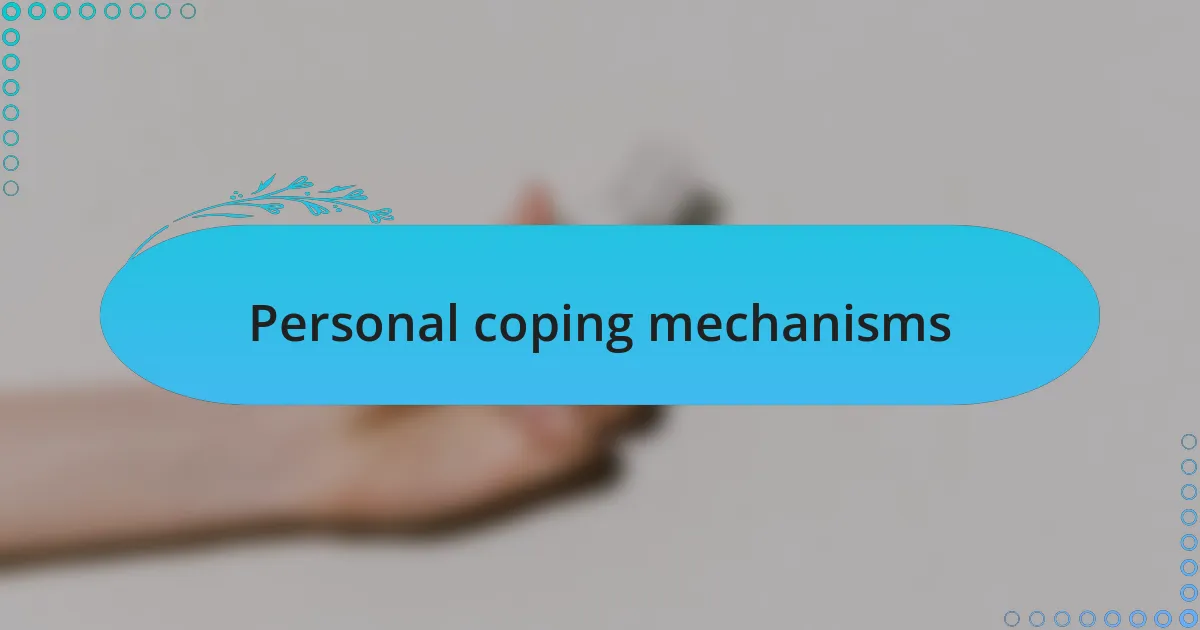
Personal coping mechanisms
Finding solace in creative outlets became essential during the pandemic. I’ve always enjoyed writing, but the isolation prompted me to delve deeper into journaling. Putting my thoughts on paper allowed me to process feelings that often felt overwhelming, and I’d often reflect on how those quiet moments of introspection brought clarity amidst the noise. Have you ever tried expressing your thoughts through writing?
I also discovered the therapeutic effects of connecting with nature. One afternoon, feeling particularly drained, I took a spontaneous trip to a nearby park. As I sat by the lake, I was struck by the serenity of my surroundings. The sound of the water and the rustling leaves soothed my frayed nerves. It made me realize how often we overlook nature’s calming power. Isn’t it amazing how a bit of fresh air can provide a perspective shift?
Social connections, albeit virtual, became a lifeline for me. I started scheduling weekly video calls with friends, and those conversations were a breath of fresh air. Sharing laughter over silly memes or discussing our challenges made a world of difference. It’s funny how something as simple as seeing a friend’s face can lift your spirits, right? I learned that maintaining connections—even from a distance—was critical for my mental well-being during such trying times.
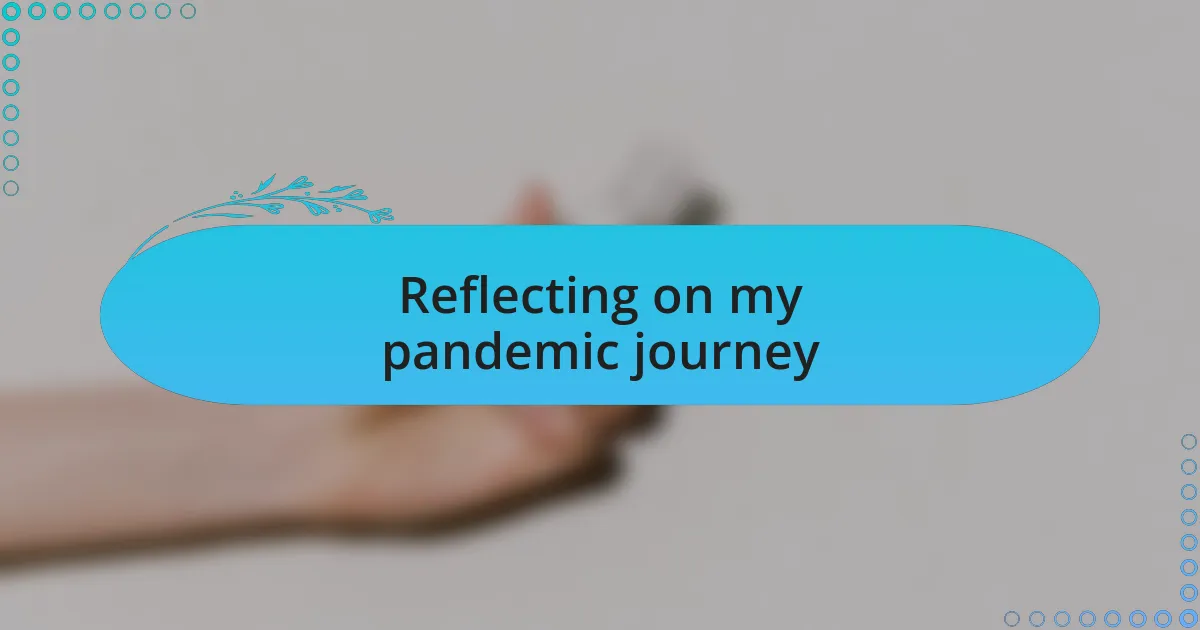
Reflecting on my pandemic journey
Reflecting on my pandemic journey brings a mix of memories, both heavy and light. I remember those early days when the weight of uncertainty felt like an anchor. I often found myself staring blankly at the walls, wondering what life would look like beyond the confines of my home. Have you ever felt such a profound shift in your reality that it left you grappling for something to hold onto?
There were moments of resilience that bubbled up unexpectedly. I recall cooking elaborate meals just to fill the time, turning my kitchen into a makeshift sanctuary. Each dish was an adventure, and with every new recipe, I felt a sense of achievement. It was a reminder that even during chaotic times, small victories can spark joy. The act of creating something nourishing transformed not just my meals but my mood. Did you find comfort in the rhythm of everyday tasks?
As the months went by, I began to see the pandemic as a mirror reflecting aspects of my life I hadn’t considered before. I found myself evaluating relationships and priorities, shifting my focus toward what truly mattered. This introspective journey was difficult yet liberating, revealing how much I took for granted. How many of us emerged from this experience with a renewed sense of purpose or clarity?
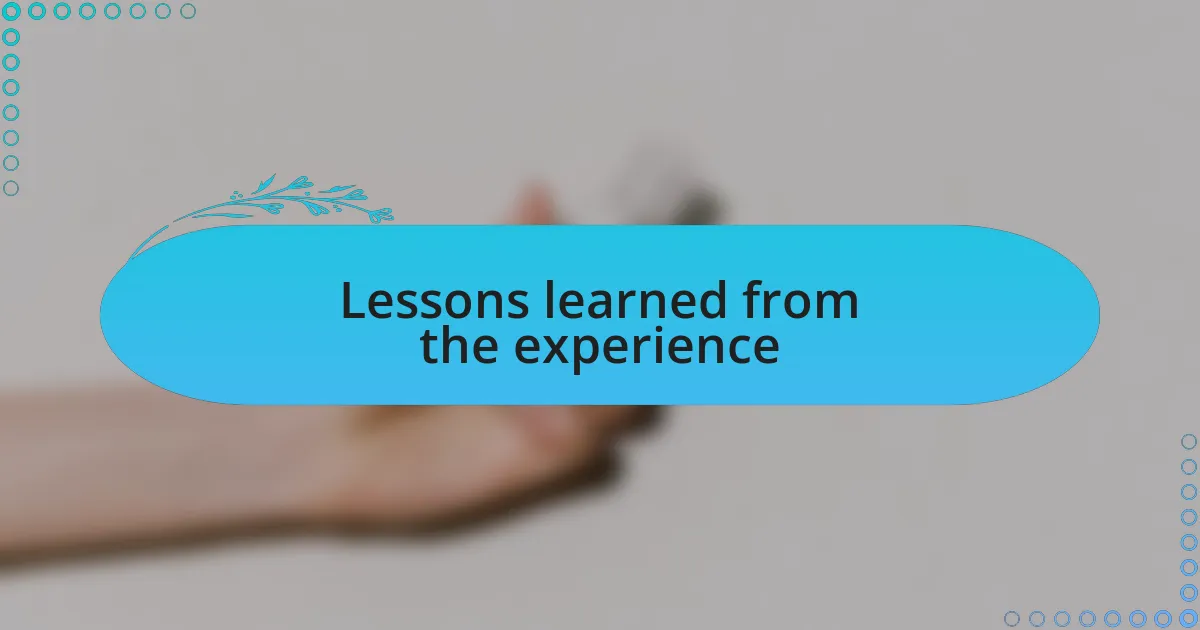
Lessons learned from the experience
The pandemic taught me the importance of adaptability in the face of change. I remember attending virtual gatherings, which often felt awkward at first. However, as I embraced this new way of connecting, I found joy in the creativity people brought to their interactions. Have you ever realized that sometimes, innovation emerges from necessity, pushing us to step outside our comfort zones?
I also learned the value of self-compassion during this period of stress. Initially, I was hard on myself for not being as productive as I thought I “should” be. But gradually, I understood that it was okay to feel overwhelmed and that my mental well-being took precedence over any to-do list. Isn’t it interesting how we often overlook our own needs in the hustle of daily life?
As I reflected on these lessons, I realized they extended far beyond the pandemic. For instance, the way I now prioritize family time and moments of stillness continues to shape my day-to-day experience. It’s fascinating to think that something as disruptive as a global crisis could lead to a more fulfilled and present version of myself. How has your perspective shifted in response to challenges?